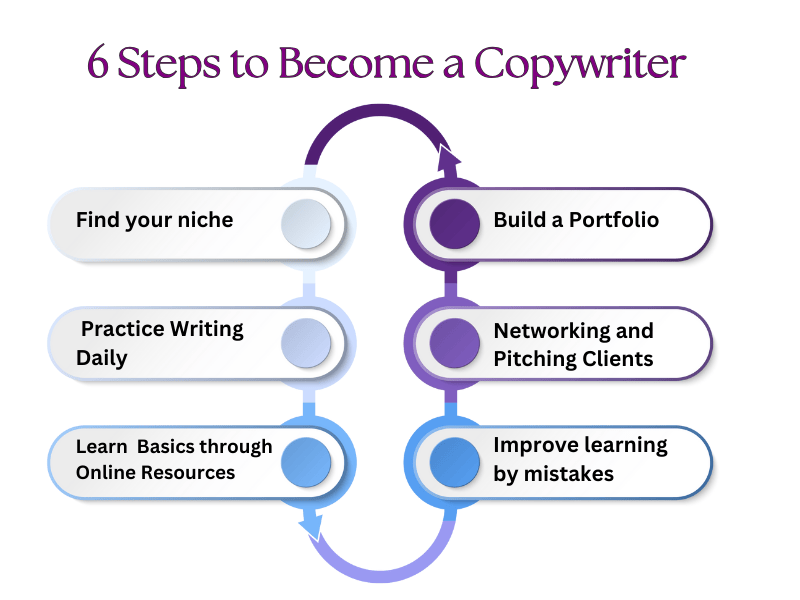Let’s learn how to become a copywriter with no experience. And the best part? You don’t need years of experience to join this exciting field. Breaking into copywriting without any experience may seem challenging, but it’s absolutely achievable with the right strategy. This guide offers practical steps, insights, and tips on how to develop the skills needed, build a portfolio, and land your first clients.
What is a Copywriter?
A copywriter creates persuasive content that engages readers and drives action—whether it’s clicking a link, subscribing to a newsletter, or making a purchase. Copywriting plays a key role in advertising campaigns, websites, product descriptions, emails, and social media marketing.
Steps to Become a Copywriter with No Experience
1. Practice Writing Daily
The best way to improve your skills is to write regularly. You can start with:
- A personal blog: Choose topics you enjoy to find your writing voice.
- Sample projects: Create mock ads or write product descriptions for brands you admire.
A unique technique is to handwrite successful sales letters to absorb proven writing styles and persuasive techniques.

2. Learn Copywriting Basics through Online Resources
Even without formal experience, you can master the fundamentals by:
- Taking online courses: Many platforms offer free or affordable courses in copywriting and marketing.
- Reading essential books on copywriting (like “Ogilvy on Advertising”) to understand the principles of persuasion.
- Following successful copywriters on social media for tips and advice.
Seeking out a mentor can also accelerate your learning by giving you personalized feedback.
3. Build a Portfolio with Spec Work
Even if you’ve never had a client, you can still create a portfolio with examples that showcase your potential.
- Write sample ad copy, product pages, or email newsletters.
- Publish guest posts or offer to write for small businesses for free in exchange for portfolio rights.
- Use platforms like Canva to design and showcase your samples visually.
If you’re new to SEO, check out How Do You Build Discovery and Relevance for Search Engines? for helpful tips.
4. Start Networking and Pitching Clients
To land your first few clients, you need to actively network and pitch your services.
- Freelancing platforms like Fiverr and Upwork are great places to begin.
- Reach out to businesses directly and offer free trial services (with the condition they pay if satisfied).
- Network on social media with other writers and businesses, and join copywriting communities.
Having an online presence makes a difference. Build a simple personal website where potential clients can view your portfolio and contact you.
5. Find Your Niche
Specializing in a specific niche makes you more appealing to clients. You could focus on:
- E-commerce copywriting: Writing product descriptions and landing pages.
- SEO content creation: Developing blogs and articles optimized for search engines.
- Email marketing: Creating newsletters and sales funnels for businesses.
For more SEO-related insights, explore Is Local SEO Dead?.
6. Improve by Learning from Mistakes
Even seasoned writers make mistakes, but continuous improvement is key. Familiarize yourself with common SEO mistakes to avoid them early on. Check out SEO Mistakes in Digital Content Production: Easy Fix for practical solutions.
Skills Needed for Copywriting Success
- Clear Writing: Keep your writing concise and engaging. Avoid unnecessary jargon.
- SEO Knowledge: Understand how to use keywords naturally in content to improve visibility.
- Time Management: Meet deadlines effectively while juggling multiple clients.
- Client Communication: Be professional and transparent when working with clients.
What is the Earning Potential for Copywriters?
Many Businesses hire copywriters and some outsource copywriters. Entry-level copywriters often start with $40,000 to $50,000 annually, but experienced freelancers can make significantly more. Some even earn six-figure incomes by specializing in lucrative niches like sales funnels and email campaigns.
FAQs
1. Do I Need a Degree to Become a Copywriter?
No, copywriting is a skill-based field. Clients care more about the quality of your writing than formal qualifications.
2. How Do I Find Clients as a Beginner?
Start with freelancing platforms like Fiverr, pitch small businesses directly, or join copywriting groups where businesses often post job opportunities.
3. How Do I Stand Out as a New Copywriter?
Specialize in a niche and offer free trial work to build your portfolio and earn testimonials quickly.
Conclusion: Start Small and Build Up
Breaking into copywriting with no experience requires persistence, practice, and the willingness to learn. By building a portfolio, networking strategically, and continuously improving, you can land your first clients and grow into a successful freelance copywriter.
Start with simple projects, learn from feedback, and always keep an eye out for new opportunities. Before you know it, you’ll build the experience and reputation needed to excel in the industry. With dedication and the right skills, your journey into copywriting can be both rewarding and profitable.
